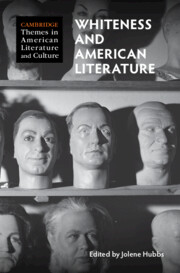Book contents
- Whiteness and American Literature
- Cambridge Themes in American Literature and Culture
- Whiteness and American Literature
- Copyright page
- Contents
- Contributors
- Acknowledgments
- Introduction
- Part I Whiteness and National Identity
- Part II Whiteness in the American Literary Imagination
- Part III Approaches to Whiteness
- Further Reading
- Index
Introduction
Published online by Cambridge University Press: 19 June 2025
- Whiteness and American Literature
- Cambridge Themes in American Literature and Culture
- Whiteness and American Literature
- Copyright page
- Contents
- Contributors
- Acknowledgments
- Introduction
- Part I Whiteness and National Identity
- Part II Whiteness in the American Literary Imagination
- Part III Approaches to Whiteness
- Further Reading
- Index
Summary
The introduction sets the stage for the chapters to come by offering a brief historical overview of writers’ and scholars’ engagements with whiteness. Starting with Toni Morrison’s insights into the whiteness of the whale in Herman Melville’s Moby-Dick (1851), this chapter traces an intellectual genealogy that proceeds from what Morrison saw in Melville’s work to what Melville learned from reading Frederick Douglass’s 1845 autobiography. It surveys different kinds of literary treatments of whiteness, more than two centuries of which are treated in this volume, and offers a quick history of the development of whiteness studies before looking ahead to each chapter’s main arguments.
Information
- Type
- Chapter
- Information
- Whiteness and American Literature , pp. 1 - 10Publisher: Cambridge University PressPrint publication year: 2025
